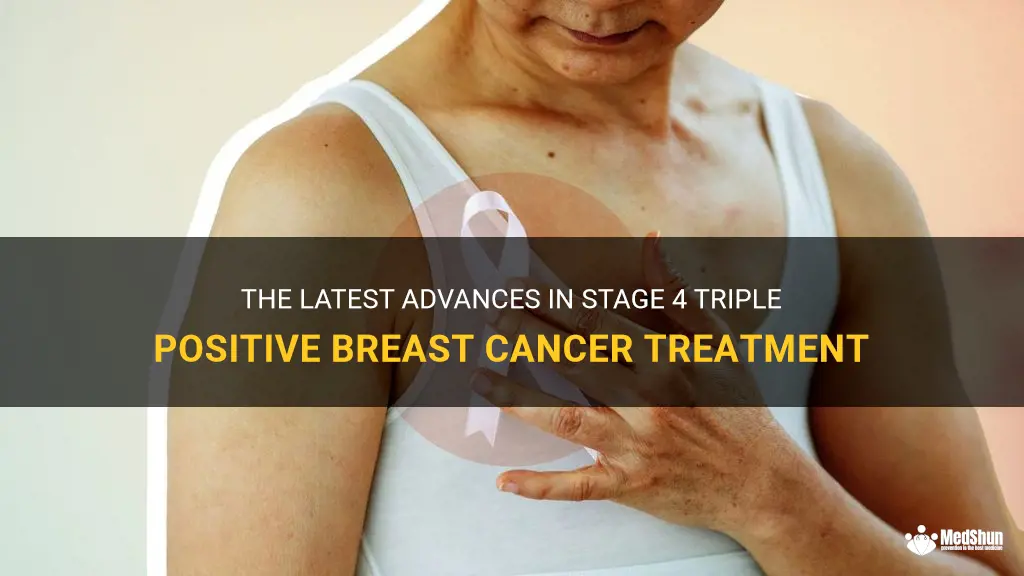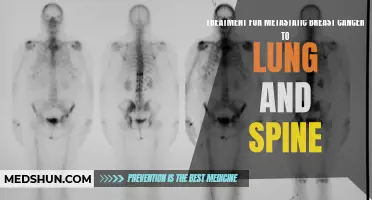
Stage 4 triple positive breast cancer is a highly aggressive form of breast cancer that affects women worldwide. It is characterized by the presence of three proteins – estrogen receptor (ER), progesterone receptor (PR), and human epidermal growth factor receptor 2 (HER2) – all of which play a crucial role in the growth and proliferation of cancer cells. Treating stage 4 triple positive breast cancer poses a unique challenge due to its aggressive nature and the complexity of targeting multiple proteins simultaneously. However, advancements in medical research and treatment options provide hope for improved outcomes and a brighter future for patients battling this subtype of breast cancer.
| Characteristics | Values |
|---|---|
| Hormone receptor status | Positive (estrogen, progesterone) and HER2 positive |
| Treatment options | Chemotherapy, targeted therapy, hormone therapy, radiation therapy, surgery |
| Chemotherapy regimens | Anthracycline-based regimens (e.g. AC), Taxane-based regimens (e.g. TCH) |
| Targeted therapy | Trastuzumab (Herceptin), Pertuzumab (Perjeta) |
| Hormone therapy | Aromatase inhibitors, Tamoxifen, Fulvestrant |
| Radiation therapy | External beam radiation therapy |
| Surgery | Lumpectomy, mastectomy |
| Response to treatment | Varies depending on individual |
| Prognosis | Varies depending on individual |
| Possible side effects of treatment | Nausea, hair loss, fatigue, neuropathy, heart problems |
| Follow-up care and monitoring | Regular check-ups, imaging tests, blood tests |
| Supportive care and managing side effects | Anti-nausea medications, pain management, counseling, support groups |
| Clinical trials | Participation may be an option |
| Emotional support and mental health | Psychosocial support, therapy, self-care strategies |
What You'll Learn
- What are the most common treatment options for stage 4 triple positive breast cancer?
- What role does hormone therapy play in the treatment of this type of breast cancer?
- Are there any targeted therapies specifically developed for stage 4 triple positive breast cancer?
- What is the typical course of treatment for patients with stage 4 triple positive breast cancer?
- Are there any clinical trials or experimental treatments available for patients with this type of breast cancer?

What are the most common treatment options for stage 4 triple positive breast cancer?
Stage 4 triple positive breast cancer is a subtype of breast cancer that is characterized by the presence of three specific biomarkers: estrogen receptor (ER), progesterone receptor (PR), and human epidermal growth factor receptor 2 (HER2). This subtype accounts for around 15-20% of all breast cancer cases. The stage 4 designation means that the cancer has spread beyond the breast to other parts of the body, such as the bones, liver, lungs, or brain.
The treatment of stage 4 triple positive breast cancer is aimed at controlling the disease and improving the patient's quality of life. The most common treatment options include
Hormonal therapy:
Since the tumor in triple positive breast cancer is responsive to estrogen and progesterone, hormonal therapy is often the first line of treatment. This therapy aims to block or reduce the production of these hormones or block their action on cancer cells. Common hormonal therapies include tamoxifen, aromatase inhibitors, and ovarian suppression. These drugs can help slow down the growth and spread of the cancer cells.
Targeted therapy:
HER2-positive breast cancer is characterized by the overexpression of the HER2 protein, which promotes aggressive tumor growth. Targeted therapy drugs like trastuzumab (Herceptin) and pertuzumab (Perjeta) specifically block the action of HER2 on cancer cells, inhibiting their growth and spread. These drugs are usually administered in combination with chemotherapy or hormonal therapy.
Chemotherapy:
Chemotherapy is a systemic treatment that involves the use of powerful drugs to destroy cancer cells throughout the body. In stage 4 triple positive breast cancer, chemotherapy is often used in combination with targeted therapy and hormonal therapy for better outcomes. The specific chemotherapy drugs and regimen may vary depending on the patient's overall health and response to treatment.
Radiation therapy:
Radiation therapy uses high-energy radiation to target and kill cancer cells. It is often used in the management of advanced breast cancer to relieve symptoms and improve quality of life. Radiation therapy may be used to shrink tumors in the breast or other areas of the body affected by the cancer.
Surgery:
In some cases, surgery may be performed to remove the primary tumor in the breast or other affected areas. This is generally done to reduce the size of the tumor and alleviate symptoms, rather than aiming for a cure. Surgery may also be used to stabilize bones affected by metastasis or to manage complications such as pathological fractures.
Palliative care:
In advanced stage 4 triple positive breast cancer, palliative care becomes an important component of treatment. Palliative care focuses on preventing and managing symptoms, improving the patient's quality of life, and providing emotional and psychosocial support. This may involve pain management, counseling, support groups, and assistance with practical issues such as transportation or financial concerns.
It is important to note that the treatment approach for stage 4 triple positive breast cancer may vary from patient to patient, depending on factors such as the extent of the disease, the patient's overall health, and their individual treatment goals. Close collaboration between the patient and their healthcare team is crucial to develop an individualized treatment plan that best suits their needs and preferences.
The Potential Role of Kefir in Breast Cancer Treatment: A Review
You may want to see also

What role does hormone therapy play in the treatment of this type of breast cancer?
Hormone therapy is an essential component in the treatment of hormone receptor-positive breast cancer. This type of breast cancer is characterized by the presence of hormone receptors, specifically estrogen receptors (ER) and/or progesterone receptors (PR), on the surface of breast cancer cells. The presence of these receptors indicates that the breast cancer cells are sensitive to the hormones estrogen and/or progesterone, and therefore, hormone therapy can be used to target and inhibit the effects of these hormones on the cancer cells.
The primary goal of hormone therapy in the treatment of hormone receptor-positive breast cancer is to reduce the levels of estrogen and/or progesterone in the body or block the effects of these hormones on the cancer cells. This can be achieved through various strategies, including the use of medications that lower hormone levels or medications that block the hormone receptors.
One commonly used hormone therapy medication is tamoxifen, which is a selective estrogen receptor modulator (SERM). Tamoxifen works by binding to the estrogen receptors in the breast cancer cells, thereby preventing the binding of estrogen and inhibiting the growth and division of the cancer cells. Tamoxifen is typically prescribed for premenopausal women with hormone receptor-positive breast cancer and is taken daily for a duration of 5-10 years.
Another type of hormone therapy medication is aromatase inhibitors (AI), which are often used in postmenopausal women with hormone receptor-positive breast cancer. Aromatase inhibitors work by blocking the enzyme aromatase, which is responsible for converting androgens into estrogen. By inhibiting aromatase, these medications effectively lower the levels of estrogen in the body and inhibit the growth and division of the cancer cells.
In addition to tamoxifen and aromatase inhibitors, other hormone therapy medications may be used depending on the specific characteristics of the breast cancer. These can include medications that block progesterone receptors or medications that suppress ovarian function, such as luteinizing hormone-releasing hormone (LHRH) agonists.
It is important to note that hormone therapy is generally not used as a standalone treatment for breast cancer but is typically combined with other treatments, such as surgery, radiation therapy, or chemotherapy. The combination of hormone therapy with these other treatments aims to provide a comprehensive approach to treatment and improve overall outcomes.
The decision to use hormone therapy in the treatment of hormone receptor-positive breast cancer is based on a variety of factors, including the stage and characteristics of the cancer, the age and menopausal status of the patient, and the presence of other health conditions. It is essential to consult with a healthcare professional to determine the most appropriate treatment plan for individual cases.
In summary, hormone therapy plays a critical role in the treatment of hormone receptor-positive breast cancer. By targeting and inhibiting the effects of estrogen and/or progesterone, hormone therapy medications can effectively slow down or stop the growth and division of cancer cells. When combined with other treatments, hormone therapy can significantly improve outcomes and contribute to the overall management of this type of breast cancer.
The Importance of CoQ10 Supplementation After Breast Cancer Treatment
You may want to see also

Are there any targeted therapies specifically developed for stage 4 triple positive breast cancer?
Triple positive breast cancer is a subtype of breast cancer that is characterized by the presence of three specific receptors on the surface of cancer cells: estrogen receptor (ER), progesterone receptor (PR), and human epidermal growth factor receptor 2 (HER2). This means that the cancer is fueled by the hormones estrogen and progesterone, as well as by the HER2 protein.
Stage 4 triple positive breast cancer refers to cancer that has spread beyond the breast to other parts of the body, such as the bones, liver, or lungs. It is considered an advanced stage of the disease and can be challenging to treat.
In recent years, there have been significant advancements in the development of targeted therapies for stage 4 triple positive breast cancer. These therapies specifically target the receptors found on the surface of cancer cells, aiming to block their activity and inhibit the growth and spread of the cancer.
One such targeted therapy is trastuzumab, also known as Herceptin. Trastuzumab specifically targets the HER2 receptor and has been shown to improve survival in patients with HER2-positive breast cancer. It can be used in combination with chemotherapy or other targeted therapies to provide a more comprehensive treatment approach.
Another targeted therapy that has shown promise in the treatment of stage 4 triple positive breast cancer is pertuzumab. Pertuzumab targets a different part of the HER2 receptor than trastuzumab, and the combination of the two drugs has been shown to significantly improve outcomes in patients with advanced HER2-positive breast cancer.
In addition to HER2-targeted therapies, hormone therapy plays a crucial role in the treatment of triple positive breast cancer. Drugs such as tamoxifen and aromatase inhibitors (such as anastrozole or letrozole) work by blocking the effects of estrogen on cancer cells. These therapies are particularly effective in patients with ER-positive breast cancer but can also provide benefits in triple positive breast cancer.
While targeted therapies have provided significant advancements in the treatment of stage 4 triple positive breast cancer, it is important to note that not all patients will respond equally to these treatments. Cancer cells can develop resistance to targeted therapies over time, leading to treatment failure. Therefore, ongoing research is focused on finding new targeted therapies and understanding the mechanisms of resistance to improve outcomes for patients with this subtype of breast cancer.
It is also important to remember that targeted therapies are often used in combination with other treatments, such as chemotherapy or radiation therapy, to provide a more comprehensive approach to treatment. The specific treatment approach for stage 4 triple positive breast cancer will depend on various factors, including the individual patient's characteristics, the extent of the disease, and the presence of any other health conditions.
In conclusion, there are targeted therapies specifically developed for stage 4 triple positive breast cancer. These therapies target the receptors found on the surface of cancer cells, such as HER2 and hormone receptors, aiming to inhibit the growth and spread of the cancer. Trastuzumab, pertuzumab, and hormone therapy are examples of targeted therapies used in the treatment of stage 4 triple positive breast cancer. However, ongoing research is still needed to improve outcomes and overcome resistance to these targeted therapies.
The Battle with Post Breast Cancer Treatment Weight Gain
You may want to see also

What is the typical course of treatment for patients with stage 4 triple positive breast cancer?
Stage 4 triple positive breast cancer is an advanced form of breast cancer that has spread to other parts of the body. This type of breast cancer is characterized by the presence of three types of receptors on the surface of the cancer cells: estrogen receptor (ER), progesterone receptor (PR), and human epidermal growth factor receptor 2 (HER2). The presence of these receptors allows for targeted treatment options.
The course of treatment for stage 4 triple positive breast cancer may vary depending on various factors, including the extent of the disease, the overall health of the patient, and the patient's preferences. However, there are some standard treatment options that are often utilized in this situation.
The first line of treatment for stage 4 triple positive breast cancer typically involves a combination of targeted therapies and chemotherapy. Targeted therapies are medications that specifically target the cancer cells based on the presence of specific receptors. In the case of triple positive breast cancer, targeted therapies may include drugs like trastuzumab (Herceptin), pertuzumab (Perjeta), and aromatase inhibitors, such as letrozole or exemestane.
Chemotherapy, on the other hand, is a systemic treatment that aims to kill cancer cells throughout the body. It is often used in combination with targeted therapies to maximize the effectiveness of the treatment. Chemotherapy drugs commonly used for triple positive breast cancer include taxanes, anthracyclines, and platinum-based drugs.
In addition to targeted therapies and chemotherapy, hormone therapy may also be recommended for patients with stage 4 triple positive breast cancer. Hormone therapy aims to block the effects of estrogen and progesterone, which can fuel the growth of breast cancer cells. Common hormone therapies for triple positive breast cancer include tamoxifen and aromatase inhibitors.
Surgery may also be considered as part of the treatment plan for stage 4 triple positive breast cancer. However, the role of surgery in this situation is generally limited to removing tumors that are causing significant symptoms or complications, rather than as a curative treatment.
Throughout the course of treatment, regular monitoring and imaging tests, such as CT scans, PET scans, and bone scans, will be performed to assess the response to treatment and detect any new areas of spread.
It is important to note that the treatment of stage 4 triple positive breast cancer is usually a lifelong process. While it may not be possible to completely eliminate the cancer, the goal of treatment is to control the disease, relieve symptoms, and prolong survival. With advances in targeted therapies and other treatment modalities, the prognosis for patients with stage 4 triple positive breast cancer has improved significantly in recent years.
In conclusion, the typical course of treatment for patients with stage 4 triple positive breast cancer involves a combination of targeted therapies, chemotherapy, hormone therapy, and possibly surgery. Regular monitoring and imaging tests are performed to assess the response to treatment. While the treatment is lifelong, advances in treatment options have improved survival rates for patients with this type of breast cancer.
The Effectiveness of Afinitor Duration of Treatment for Breast Cancer: What You Need to Know
You may want to see also

Are there any clinical trials or experimental treatments available for patients with this type of breast cancer?
Breast cancer is one of the most common cancers among women worldwide. There are different types of breast cancer, and each type may have different treatment options.
For patients with a specific type of breast cancer, such as triple-negative breast cancer, there may be clinical trials or experimental treatments available. Clinical trials are research studies that test new medical treatments or interventions to determine their safety and effectiveness. These trials are conducted under strict guidelines and protocols to ensure the well-being of the participants.
In the case of triple-negative breast cancer, which accounts for about 10-20% of all breast cancers, researchers are continuously exploring new treatment options. Triple-negative breast cancer is characterized by the absence of estrogen receptor (ER), progesterone receptor (PR), and human epidermal growth factor receptor 2 (HER2) expression. Because these receptors are not present, treatments that target them, such as hormone therapy or HER2-targeted therapy, are not effective.
However, there are ongoing clinical trials specifically designed to test new treatments for triple-negative breast cancer. These trials may investigate novel chemotherapy regimens, targeted therapies, immunotherapy approaches, or combinations of different treatments.
For example, one clinical trial may be testing the effectiveness of a new chemotherapy drug, combined with an immunotherapy medication. The goal of this trial is to determine if the combination treatment can improve outcomes for patients with triple-negative breast cancer. Another clinical trial may be exploring the use of a targeted therapy drug that specifically targets a specific mutation found in triple-negative breast cancer cells.
Patients interested in participating in a clinical trial should consult with their healthcare providers. These professionals can guide them through the process of finding and enrolling in a suitable trial. It is important to note that not all patients will be eligible for every trial, as the inclusion and exclusion criteria may vary.
Participating in a clinical trial can provide patients with access to innovative treatments that may be more effective than standard therapies. However, it is important to consider the potential risks and benefits of participating in a trial. Patients should thoroughly discuss this decision with their healthcare team and carefully weigh the potential benefits against the possible risks.
In summary, for patients with triple-negative breast cancer, there may be clinical trials or experimental treatments available. These trials aim to explore new treatment options and improve outcomes for patients with this specific type of breast cancer. Patients interested in participating in a clinical trial should speak with their healthcare providers to determine if they are eligible and to learn more about the potential risks and benefits.
Can Breast Cancer Cause Fatigue Before Treatment?
You may want to see also
Frequently asked questions
Stage 4 triple positive breast cancer is an advanced stage of breast cancer that is characterized by the presence of three specific receptors on breast cancer cells: estrogen receptor (ER), progesterone receptor (PR), and human epidermal growth factor receptor 2 (HER2). This type of breast cancer is considered aggressive and requires targeted treatment.
Treatment options for stage 4 triple positive breast cancer typically involve a combination of therapies. These may include chemotherapy, hormone therapy, targeted therapy, radiation therapy, and surgery. The specific treatment plan will depend on factors such as the extent of the cancer, the individual's overall health, and the presence of other medical conditions.
Targeted therapy has been shown to be highly effective in the treatment of stage 4 triple positive breast cancer. Drugs such as trastuzumab (Herceptin) and pertuzumab (Perjeta), which target the HER2 protein, have significantly improved outcomes for patients with this type of breast cancer. These targeted therapies can help shrink tumors, slow down the growth of cancer cells, and improve overall survival rates.
While stage 4 triple positive breast cancer is generally not considered curable, advancements in treatment options have greatly improved long-term survival rates for patients with this diagnosis. With aggressive and targeted therapies, it is possible to manage the disease, control its progression, and extend the patient's lifespan. The goal of treatment is often to achieve long-term remission or to keep the cancer under control for an extended period of time.
The side effects of treatment for stage 4 triple positive breast cancer can vary depending on the specific therapies used. Common side effects may include fatigue, hair loss, nausea, vomiting, diarrhea, decreased immune function, and an increased risk of infections. It is important for patients to discuss potential side effects with their healthcare team and to manage them proactively with medications or supportive care measures.







